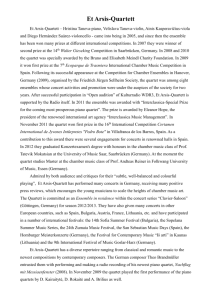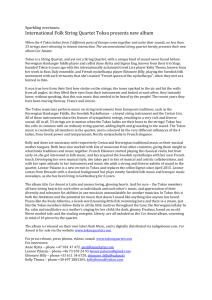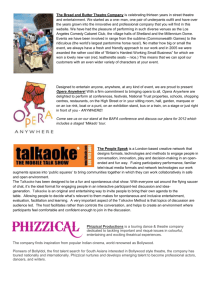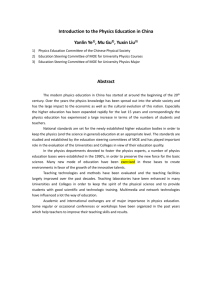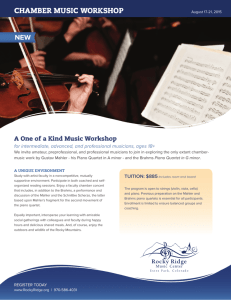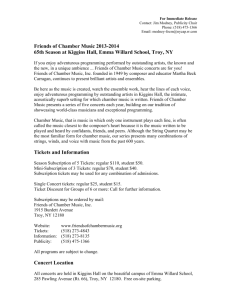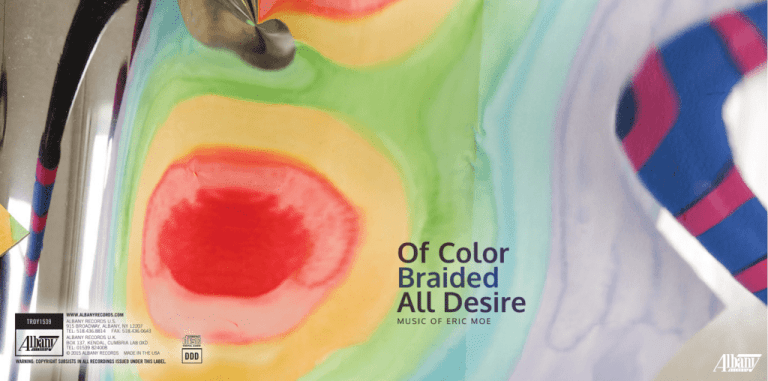
TROY1539
WWW.ALBANYRECORDS.COM
ALBANY RECORDS U.S.
915 BROADWAY, ALBANY, NY 12207
TEL: 518.436.8814 FAX: 518.436.0643
ALBANY RECORDS U.K.
BOX 137, KENDAL, CUMBRIA LA8 0XD
TEL: 01539 824008
© 2015 ALBANY RECORDS MADE IN THE USA
WARNING: COPYRIGHT SUBSISTS IN ALL RECORDINGS ISSUED UNDER THIS LABEL.
Of Color
Braided
All Desire
MUSIC OF ERIC MOE
DDD
The Composer
The Music
Eric Moe (b. 1954), composer of what the New York Times calls “music of winning exuberance,” has
received numerous grants and awards for his work, including the Lakond Award from the American
Academy of Arts and Letters and a Guggenheim Fellowship; commissions from the Pittsburgh
Symphony Orchestra, the Fromm Foundation, the Koussevitzky Foundation, the Barlow Endowment,
and Meet-the-Composer USA; and residencies at the MacDowell Colony, Yaddo, Bellagio, the
Camargo Foundation, the Virginia Center for the Creative Arts, and many others.
Strange Exclaiming Music, a CD of Moe’s chamber music, was released in 2009 by Naxos.
Fanfare magazine described it as “wonderfully inventive, often joyful, occasionally melancholy, highly
rhythmic, frequently irreverent, absolutely eclectic, and always high-octane music.” His sit-trag/
one-woman opera Tri-Stan, available on a Koch International Classics CD, was greeted by the New
York Times as “a tour de force” that “subversively inscribes classical music into pop culture.” Kick &
Ride, on the bmop/sound label, was picked by WQXR for album of the week: “…it’s completely easy
to succumb to the beats and rhythms that come out of Moe’s fantastical imaginarium, a headspace
that ties together the free-flowing atonality of Alban Berg with the guttural rumblings of Samuel
Barber’s Medea, adding in a healthy dose of superhuman strength.” Other all-Moe CDs are available
on New World Records (Meanwhile Back At The Ranch), Albany Records (Kicking and Screaming, Up
& At ‘Em, Siren Songs), and Centaur (On the Tip of My Tongue).
Moe studied composition at Princeton University (B.A.) and at the University of California
at Berkeley (M.A., Ph.D.). He is currently Andrew W. Mellon Professor of Music at The Music at
the University of Pittsburgh and has held visiting professorships at Princeton University and the
University of Pennsylvania. More information is available at his website (www.ericmoe.net).
“Poetry,” May Swenson once wrote, “is based in a craving to get through the curtains of things
as they appear, to things as they are, and then into the larger, wilder space of things as they are
becoming.” Those things include thoughts, intentions, emotions—as in Swenson’s poem “Fireflies”:
Idea’s anonymous
ordinary mark
that cryptic
in daylight crept,
can rise an asterisk
astonishing others out.
Images seize the attention and then let go, like the ocean currents in “Swimmers,” gripping the
swimmer’s hair, then launching her into buoyancy.
This is the sound of string instruments, the bow snagging the string, the string vibrating free,
a continuous cycle of capture-and-release. It is the sound of Eric Moe’s Of Color Braided All Desire,
a cycle of four songs from Swenson’s poetry, composed for Christine Brandes and the Brentano
String Quartet. The soprano weaves Swenson’s words; the instruments re-enact Swenson’s drama:
sharply-bowed accents grabbing the strings’ edge, ensnaring the sound, then giving way to longer,
floating lines. The music at first shadows and mirrors the text, but eventually shadows the words
with implications of its own.
In “Swimmers,” the accompaniment slips between heavy, pinpoint attacks and ripples of
slurred bowing; the singer floats across the surface, the natural stresses of the text abstracted into
melodic angles. “Four Word Lines” finds a variety of textures to bridge the gaps left by Moe’s respect
for line breaks; double-stops and tremolos between notes shift from solid to liquid. “Fireflies” is
appropriately darting, but eventually more lyrical lines coalesce, as if to trace faint trails of light in
the night air. “Incantation” starts off with short, heavy, repeated figures, as if hewn out of rock; by
the end, the poem—and the music—turn simultaneously melancholy and airborne.
Swenson’s poems set up mirrors between the course of love and the course of nature, processes
and routines nudged off-balance and enriched by particular moments. They are almost tailor-made for
Moe’s music, which is full of singular effects and patterns that never quite repeat exactly, movement
and location jostling for prominence. Learned and playful, precise but prone to flights of fancy, Moe’s
catalog has run the gamut, with music that has often displayed a tendency to mischief, whether in
subject matter, instrumentation, or effect. The works on this recording are, for the most part, more
reflective, even weighty. But the musical personality remains, strategically curious and tactically shrewd.
And Life Like Froth Doth Throb, for viola and cello, works that trickiness on a compact canvas.
The oldest piece on this recording, it was written in 1997 for Cynthia Fogg and Tom Flaherty. A
thrum of repeated notes seems to set up music of urgent drive, but jabbing interjections and feints
toward lyricism jumble the grid. It’s perpetual motion with blinders off, pirouetting in every direction,
expending all its energy just to stay tethered to its careening orbit.
A grand jaunt of percussion, Danger: Giant Frogs (the title comes from a vandalized Italian
warning Moe noticed, and remembered, on a Lake Como excursion) was commissioned by the
Koussevitzky Foundation and composed for the New York-based ensemble Talujon. There are a few
batrachian touches: a croaking guiro, a pond’s worth of chattering woodblocks, the throaty, undulating
chirp of Chinese opera gongs. But the piece lives at the interstice between the individual and the
collective—the relationship between drumstroke, beat, and meter constantly shifting. Sometimes,
the tempo or pattern changes imperceptibly, sometimes the entire mechanism comes to a halt, then
turns on a dime. In the work’s second half, another continuum comes into play—between noise and
pitch—as marimba and vibraphone enter, at first providing a calm anchor, but soon teeming in tandem
with the rest. Only at the end does the camera zoom out enough to create the illusion of unity.
Gong Tormented, composed for percussionist Dominic Donato in 2007, also features the eerie
twang of a Chinese opera gong, along with two tam-tams and a suspended cymbal. Each ignites
and decays in its own way; a variety of beaters and techniques further builds the vocabulary. With its
title borrowed from Yeats—“the gong-tormented sea”—the piece abstractly translates the stormier
of water musics, the ocean’s mass distilled to a dance of crashing, burbling, and glinting. But it
shares with Danger: Giant Frogs that sense of deliberate disorientation, multiple currents of rhythm
effacing each other: music of muscular drift.
In fact, for all the variety of moods and rhetoric collected here—serious and sly, driving and
deliberate, insistent and understated—the defining features of Moe’s music remain consistent: the
expressively precipitous melodies, machine-like repeated notes gathered into constantly shifting
confederations, asymmetric rhythmic patterns that reveal larger, superimposed levels of phrasing,
harmonies that collide and bloom with rich friction. The Salt of Broken Tears, composed in 2012 for
the Manhattan String Quartet, combines all these features into a somber monument. The atmosphere
at the opening is specified as “fierce, biting”; the opening interval between the cello and the violin,
a harsh major seventh, sets the harmonic tone. Inspired by Sarajevo, the city where the piece was
premiered (and quoting the most famous of Bosnian folk songs, “Kad ja pod̄oh na Bembašu”), The
Salt of Broken Tears maintains its dark cast, even in interludes of sprightlier give-and-take or lilting
dance. Moe’s serious play easily adapts when the play is serious.
The title comes from Shakespeare, from Troilus and Cressida, Troilus noting how, at parting,
an entire relationship is collapsed into a single goodbye, how “Injurious time... scants us with a
single famish’d kiss, / Distasted with the salt of broken tears.” But all of the music on this album,
in its restlessness, its unorthodox momentum, its constant evolution, might well be summed up by
Ulysses, in the same play, trying to coax Achilles from his tent: “[T]hings in motion,” he reminds the
reluctant hero, “sooner catch the eye / Than what not stirs.”
— matthew guerrieri
Of Color
Braided
All Desire
from The Complete
Love Poems of
May Swenson
I. SWIMMERS
Tossed by the muscular sea,
we are lost,
and glad to be lost
in troughs of rough
then dangled, let go,
made to race –
as the wrestling chest
of the sea, itself
tangled, tumbles
love. A bath in
laughter, our dive
into foam,
our upslide and float
on the surf of desire.
in its own embrace.
Our limbs like eels
are water-boned,
our faces lost
to difference and
But sucked to the root
of the water-mountain - immense - about to tip upon us
the terror of total
contour, as the lapping
crests.
They cease
their charge,
and rock us
delight - we are towed,
helpless in its
swell, by hooks
of our hair;
in repeating hammocks
of the releasing
tide –
until supine we glide,
on cool green
smiles
of an exhaling
gladiator,
to the shore
of sleep.
II. FOUR-WORD LINES
Your eyes are just
like bees, and I
feel like a flower.
Their brown power makes
a breeze go over
my skin. When your
lashes ride down and
rise like brown bees’
legs, your pronged gaze
makes my eyes gauze.
I wish we were
in some shade and
no swarm of other
eyes to know that
I’m a flower breathing
bare, laid open to
your bees’ warm stare.
I’d let you wade
in me and seize
with your eager brown
bees’ power a sweet
glistening at my core.
III. FIREFLIES
Fireflies throw
love winks
to their kind
on the dark, glow
without heat,
their day bodies
common beetles.
In a planetarium
of the mind
sparks lit
when logic has gone
down
faint in the dawn
of intellect.
Instinct
makes luminous
the insect.
Idea’s anonymous
ordinary mark,
that cryptic
in daylight crept,
can rise an asterisk
astonishing others out.
If the secret
of the dark
be kept,
an eagerness
in smallest, fiercest
hints
can scintillate.
IV. INCANTATION
Bright sleep bathing breathing walking
snow ocean and fire
spinning white and flinching green
red-and-yellow-petaled sheen
color me with fresh desire
Burning now spin me so with black sea
to braided be In green sleep eons leap
from gray slime past thought and time
to pith and power to bathe in the immortal hour
to breathe from another pulsing flower
Vast sleep snow as deep
fresh the leap to green and steep flinching wave
pulsing red glowers flow on black below
Snow ocean white fire
color me with fresh desire
In black sleep brightness keep
in colored day spin and play
fresh foam sharp snow the slime of time whirl away
Fire is air is breath and green
lakes of air I walking swim
Poems from THE COMPLETE LOVE POEMS OF MAY
SWENSON. Copyright © 1991, 2003 by The Literary
Estate of May Swenson. Used by permission of
Houghton Mifflin Harcourt Publishing Company.
All rights reserved.
Powers are of motion made
of color braided all desire
In red and yellow flowers bathe
in snow ocean and fire
in snowy sleep on curls of flame
on shingles of the sea I climb
Dim and gray whirl away and knotted thought
and slime
The Performers
Noted for her crystalline voice and superb musicianship, soprano Christine Brandes performs concert
and operatic works on many of the world’s most distinguished stages. She has sung for the following
opera houses: San Francisco, Seattle, Washington National, Houston Grand, Minnesota, New York City
Opera, Philadelphia, Glimmerglass, Portland, and Arizona in principal roles ranging from Handel and
Mozart to Verdi, Bolcom and Britten. Orchestral engagements have included: Cleveland, Chicago, New
York Philharmonic, Philadelphia, Los Angeles, San Francisco, Houston, Atlanta, Detroit, Minnesota, and
National Symphony, with such distinguished conductors as Simon Rattle, Pierre Boulez, Esa-Pekka
Salonen, Marin Alsop, Robert Spano, Nicholas McGegan, and Alan Gilbert.
Since its inception in 1992, the Brentano String Quartet has appeared throughout the world to
popular and critical acclaim. Within a few years of its formation, the Quartet garnered the first
Cleveland Quartet Award and the Naumburg Chamber Music Award. In addition to performing the
entire two-century range of the standard quartet repertoire, the Brentano Quartet has a strong
interest in both very old and very new music. The quartet has worked closely with some of the most
important composers of our time, including Elliott Carter, Charles Wuorinen, Chou Wen-chung,
Steven Mackey, Bruce Adolphe, and György Kurtág. The Quartet has been privileged to collaborate
with such artists as soprano Jessye Norman, pianist Richard Goode, and pianist Mitsuko Uchida. The
Quartet is named for Antonie Brentano, whom many scholars consider to be Beethoven’s “Immortal
Beloved,” the intended recipient of his famous love confession.
Hailed by the Boston Globe as “a national treasure,” the Manhattan String Quartet is well known for
their performances of 20th-century classics. The Quartet has established a significant international
reputation with regular concert appearances throughout North America, Europe, Latin America and
Asia. The ensemble has established itself as an advocate of new music through the commission
and performance of new works. In 2011, in collaboration with the Sarajevo Academy of Music,
the Manhattan Quartet established the Sarajevo Chamber Music Festival, centered on teaching,
master classes and concerts. The Quartet’s recordings include the complete Shostakovich quartets;
a Mozart/Beethoven pairing of live concert recordings; Schubert’s Quartets Nos. 14 & 15 (Death and
the Maiden); Adagio for Strings, featuring Dvorak’s American Quartet; popular encores by Turina,
Wolf, Puccini, Kern, Gershwin and Barber; and Carl Maria von Weber’s Quintet for Clarinet and
Strings with clarinetist Jon Manasse.
Acknowledgments
Known for her “polish, focus, and excitement” and “expressive, luscious sound” (New York Times),
violist and composer Jessica Meyer is a versatile musician who has been featured as a soloist
and chamber musician throughout the world. Ms. Meyer is the co-founder of the contemporary
music collective counter)induction and the ’Pipeline Collective.’ Equally at home with many other
styles of music, Jessica can regularly be seen performing on Baroque viola, improvising with jazz
musicians, or collaborating with other performer/composers. Projects on baroque viola included
collaborations with the Gotham Chamber Opera at the Metropolitan Museum of Art, and with the
Paul Taylor Dance Company.
Danger: Giant Frogs, Produced and recorded by David Cossin, Spring 2013 at Henry Rutgers Studio,
New York City. Mixed by Rob Friedman and David Cossin at Littlelife Studio, New York City.
Described as a “radiant cellist” and praised for her “rich tone” (New York Times), Karen Ouzounian
has performed as soloist, recitalist and chamber musician throughout North America and Europe.
She is a member of the Aizuri Quartet, the new music ensemble counter)induction, and the Bostonbased conductorless chamber orchestra A Far Cry. She has collaborated with renowned artists
Pamela Frank, Miriam Fried, Richard Goode, Gilbert Kalish, Kim Kashkashian, Charles Neidich,
Donald Weilerstein, and members of the Guarneri and Juilliard String Quartets. A prizewinner at
the 2012 Canada Council for the Arts Musical Instrument Bank Competition, Ms. Ouzounian holds
Master of Music and Bachelor of Music degrees from The Juilliard School.
Described by the New York Times as an ensemble possessing an “edgy, unflagging energy,” Talujon
is committed to the expansion of the contemporary percussion repertoire as well as the education
and diversification of its worldwide audience. Over the past 20 years, Talujon has commissioned
dozens of new works for percussion quartet including compositions from Alvin Lucier, Henry
Threadgill, Ralph Shapey, Wayne Peterson, Julia Wolfe, Ushio Torikai, Louis Karchin, Eric Moe,
Steve Ricks and Chien Yin Chen. Based in New York, the group was awarded the Chamber Music
America Adventurous Programming Award.
Cover art: Inverted Studio (detail), digital photograph, 2014, © Barbara Weissberger
Of Color Braided All Desire, And Life Like Froth Doth Throb recorded December 21-22, 2013; Gong
Tormented recorded September 12, 2013; and The Salt of Broken Tears recorded March 18, 2013, at
the American Academy of Arts and Letters, New York.
Produced and engineered by Judith Sherman
Engineering and editing assistant: Jeanne Velonis
Mastered by Judith Sherman and Jeanne Velonis.
All music published by Dead Elf Music.


